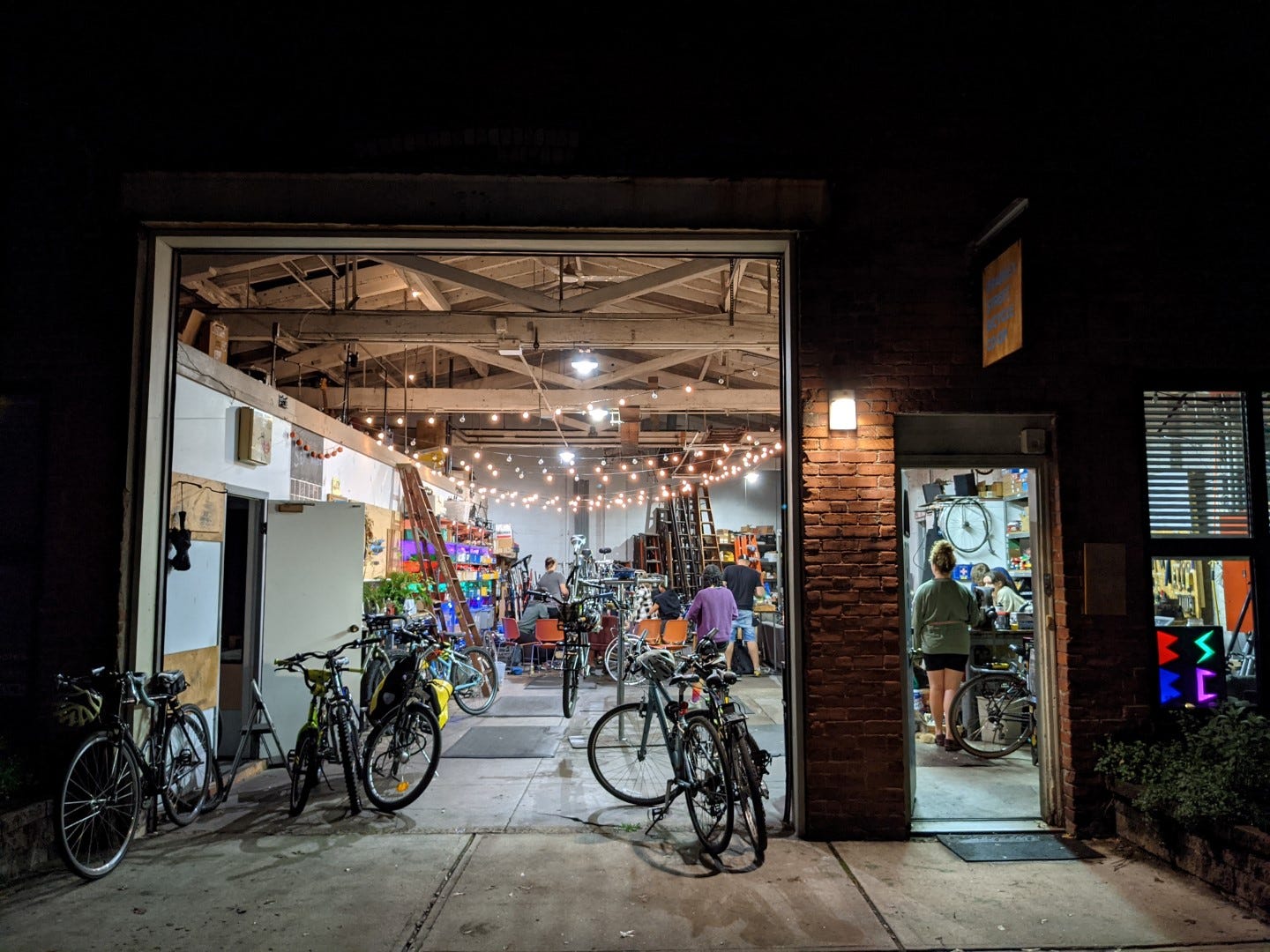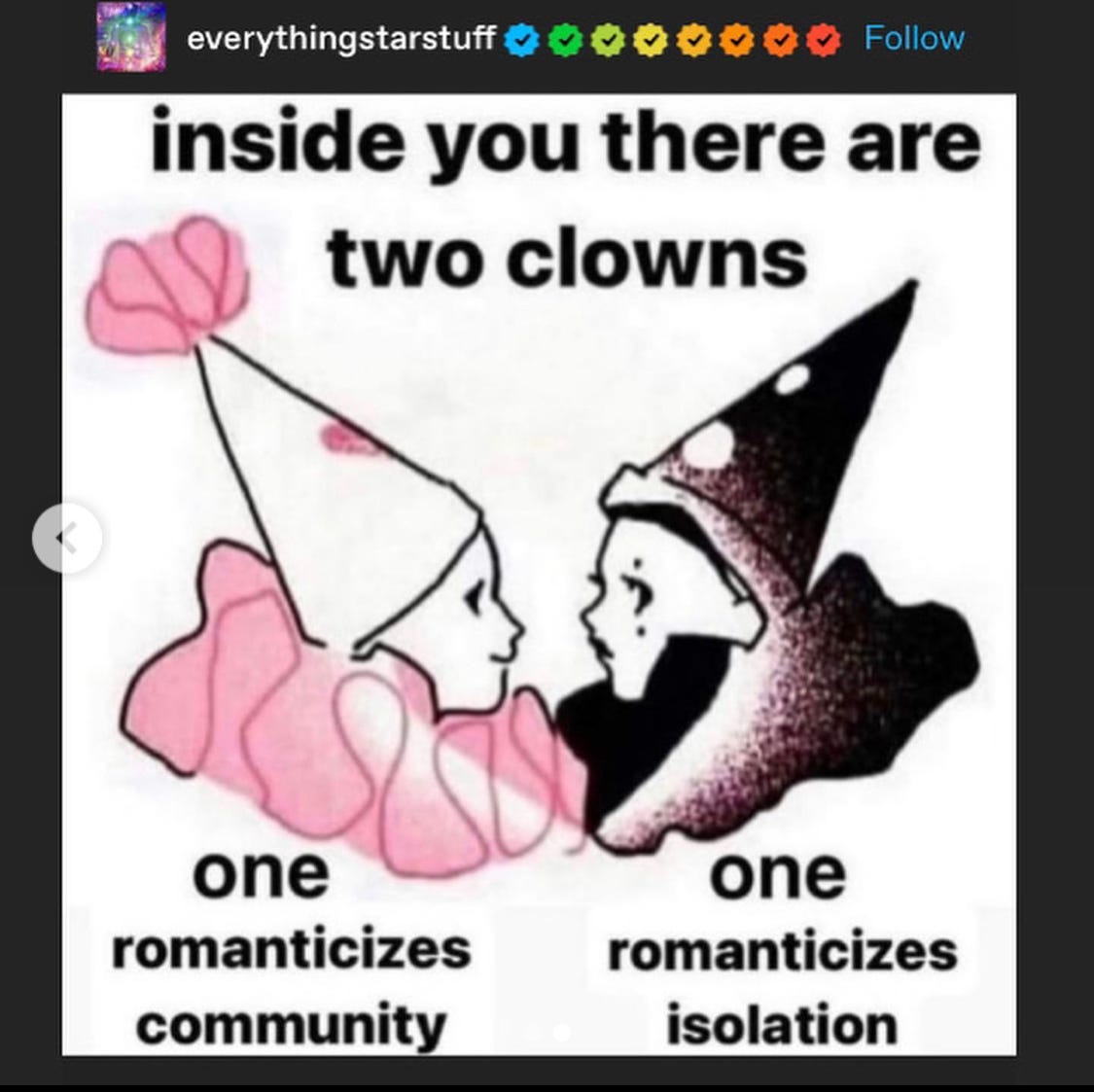✨ Thank you for joining the community craft conga line that is GROUP HUG! I am so glad you are here.✨
I have something my partner calls the “Helper Virus”. This is a non-scientific diagnosis describing my feverish impulse to get involved in everything when I get involved in something new. Maybe you have it too?
The Helper Virus tingled at my eyeballs the first time I sat down with a staff member at the bike co-op in New Haven. They were looking for help with so much. Relaunching membership. Organizing with their group for trans, non-binary, and women cyclists. Fundraising. Strategy. Volunteer development. Alternative governance.
I can help with all of this, I remember saying, licking my lips and gripping their collar and frightening them. It was the summer of 2021. I was freshly vaccinated. I was deeply bored in my 9-5 job and thought the perfect hack would be to use all of the skills I normally used in my jobs at…another place doing so much good in my community…for free, all of the time, immediately.
I apologize if you’re having a horror movie-like experience right now and are screaming “PLEASE DON’T GO IN THERE” at me. Reader, I went in there. So far in there.
I helped the Radical Adventure Riders with communications and organizing. I joined the board. I began helping to reshape membership and facilitated meetings and took notes and applied for grants. And it was so fun! I was making friends, supporting a great organization, riding my bike more than ever, and learning so much.
So later that winter, it was weird that I suddenly…didn’t want to do it anymore. I found myself being darkly glad when events were canceled because of a COVID outbreak in the shop, or when meetings were postponed because folks were out of town.
The feeling shocked me. Like, did I even enjoy this space if I was already longing for downtime? Was it all a post-vaccination-desperate-for-friendship-and-meaning fluke? Did it signal something deeper, a sign that I needed to step away completely? Was it a [gasp] toxic space?
It wasn’t. It was just that I had sort of burnt myself out.
All the familiar sensations came a-knockin’: Some people had begun to annoy me. I felt trapped in institutional problems and historical baggage. I found myself dreaming about the space at night. I knew these feelings meant burnout because I had felt them before about work.
But this wasn’t work. This was a community space meant to create a totally different feeling in my life. It was a utopia that should have been free from all the reasons why work sometimes sucks. (These were my honest, real-life assumptions, and if you’re like “well there’s your problem right there” I credit you with being wiser than I was then.)
Here’s the thing: Managing burnout works differently in a space where you’re choosing to invest your time and heart in it for free, because it’s easier to leave. This isn’t necessarily a good thing.
If you’re burnt out at a job, there’s not a ton you can do. You can take a vacation or quit or find something else. But there’s an assumption you’ll continue to do something to make money and support yourself, and you organize your life around making that work. You do whatever it takes, because you have to.
Community spaces (or anywhere we give our time and effort and hopefully make an impact and are not paid for it) operate differently. They feel much more leaveable. After all, it’s not like you’re relying on them for your financial stability.
But community spaces thrive when we can give consistent, meaningful participation over time. In fact, they rely on it.
Sure, burnout and thousands of other bad feelings can also be a sign that a space indeed isn’t great for you, and maybe the best thing to do is leave and find another place to invest your effort in. Only you can know what that threshold is for yourself.
But I was surprised to find that my threshold was relatively low. Of course it was! It is so much easier to leave. To burn bridges and bail when things are hard. It’s why participating in community spaces goes so much further than just showing up; it’s about what we are willing to feel.
And if we want the spaces of our dreams to exist, we need to be willing to feel a lot. Burnout needs to be something we notice, accept, and find creative solutions to play with. There is no other shortcut to the communities of our dreams.
So what does it take for us to stay?
Almost three years later, I’m glad to still be deeply involved in organizing with the co-op. The best way I can describe my informal strategy that has kept me feeling good in this space is seasons of participation. I try things, notice how I’m feeling about them, and change my approach based on what I think I need to keep going in the space. Hopefully this strikes some balance between where I feel good and what helps the community the most.
Here are a few tactics I have tried and seen others use to reduce burnout in community spaces:
Campaign or project-based bursts of effort. Maybe there’s a fundraising push, or a new working group getting on its feet, or a big event or deadline coming up. There’s an end date or clear parameter of success and it being “complete”. You work hard for a period of time – maybe 20% harder than you normally would – but there’s a climax to the work, and then it’s done, and you celebrate together by sharing a big sloppy pizza followed by taking a step back and resting until the next campaign.
Syncing with the seasons of your space. At the co-op, I’ve found that the winter/early spring is the best time for internal organization and fundraising, and the summer/fall is when we “do the work” the most of supporting folks fixing their bikes, leading rides, and building relationships. As a result, I’m doing more administrative and strategic support in the colder months, and am glad to not be on my computer for the co-op much at all in the summer. That’s also usually the time I am refilling my cup and remembering why I love this space so much. Maybe your community work centers around other similar seasons, like election cycles, fundraising, the weather, or school year.
Matching the seasons of your own life. Look for the natural flux in your personal life; maybe times when work is slower, or the kids are in school, or you aren’t traveling so much are the best times for you to offer more in other spaces. I’ve found that accepting this flux, and stepping back a bit When Life Attacks™ helps me continue participating in the long run. If a fellow volunteer was going on a trip or was managing a health issue, I wouldn’t expect them to keep participating at 100%. Why would I hold the same standard for myself?
Switching up your areas of focus or collaborators. I always think of a dear friend who stepped back from one working group and instead devoted her time to the community garden outside the space, growing it into something beautiful and bountiful for others and more joyful for her. There have been times I love doing the same thing I do as paid work for free. There are times when I hate that and want to use my free time to do something radically different. Same goes for the people you’re working with most; if you have the option to join a different working group, switch up your main collaborator, or try something by yourself in a community space, it could be a refreshing shift.
Maybe you mix and match a few of these! Maybe you try one and it stinks and you try another! Again, community spaces need a steady hum of our engagement to survive and thrive. Hopefully any combo of these tactics can help us continue to show up in some small way, again and again.
I’ve found that there are almost two modes of effort:
Maintenance – checking in on your group’s e-mail newsletter/Slack/Signal/Facebook groups, sharing news with others, showing up to events and meetings when you can, staying casually connected with your friendships and relationships
Building and growth – actively contributing to the growth and standing up of different efforts or campaigns
Maybe by starting to view our participation in cycles of maintenance and more concentrated bursts of effort, it allows us to see community spaces and movements as a part of our lives in longer, more sustainable swaths of time.
We participate in them for years and years, not just burning out after one hairy fundraising season or chaotic campaign.
If we want our community spaces to be sustainable resources ready for whenever we want to come back to them, we have to be a part of the equation that makes sure they’ve got what they need too. And we need to support the friends around us in making the same choices for their long term well-being and participation – after all, they’ll hopefully be the ones there to help if you need to step it back.
What if leaving a community space for good because of burnout was a last resort? How would you adapt your life to make yourself more able to stay?
Bearing Witness – This piece by
about Palestine and protest made me think about “disruptions” that remind us our country is co-funding genocide, our feelings about these reminders, and my own conditioning to tense up when instead we should be grateful. “You thank them for redirecting the group’s attention to where it needs to go.”We feel disconnected because we've been forced apart –
on the systems and algorithms and gig economies that separate us. “We’ll never get to the we of it all without talking about the systems that govern our lives.”“Building community is to the collective as spiritual practice is to the individual.” – Grace Lee Boggs (thanks to Mitch for reminding me of this)
Speaking of seasons and adaptation, loved this conversation between
and on Cultivating Creative Seasons – looking forward to reading Jacqueline’s book A Year in Practice“From each according to their ability, to each according to their need – some of you have the ability to break down your box before it goes into the communal recycling” (tiktok)
How I wish I had a single friend that was a Muppet; just one!!!!!! If you know a Muppet, please introduce me. Click here to cry.










Oh, this is SO helpful! After a whole pile of burnout (work & volunteer commitments) I've taken a big ol' step back and asked what I really need right now. A lot of advice out there is of the 'quit everything, take a long break, and come back with less on your plate' flavor. I've realized I don't actually want that kind of quiet life! But I do need some balance. (It's actually not helpful to turn every friendship into a collaborative project producer?? Wild.)
For me, this is similar to your process: sticking with some really important groups and scaling my contributions to healthy levels, and paying attention so I can adjust the balance over time.